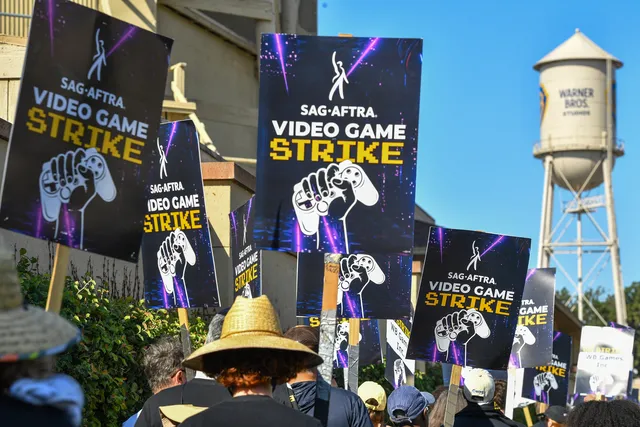Video game actors represented by SAG-AFTRA have gone on strike, joining their Hollywood counterparts in protesting against the use of artificial intelligence (AI) in the industry. The strike, which began on July 26, 2024, has halted work for many major video game producers, including Electronics Arts, Activision Productions, Insomniac Games, Take-Two Interactive, Epic Games, and WB Games.
The primary concern driving the strike is the fear that AI could replace human actors, using their likeness and performances without consent or fair compensation. SAG-AFTRA is demanding clear and enforceable protections for all actors, including voiceover artists, motion capture performers, and stunt actors. While progress has been made on some issues, the definition of a “performer” and the scope of AI protections remain major sticking points.

SAG-AFTRA president Fran Drescher emphasized the union’s stance, stating, “We’re not going to consent to a contract that allows companies to abuse AI to the detriment of our members.” The union argues that the video game companies’ proposal would leave many performers, particularly those involved in movement and stunt work, unprotected.
The video game companies, represented by a bargaining committee, claim their offer includes “meaningful AI protections” that require consent and fair compensation for all performers working under the Interactive Media Agreement (IMA). However, SAG-AFTRA rejected this proposal, arguing it would exclude a majority of movement performances and leave stunt performers vulnerable to replacement by “soulless synthetic performers.”
This strike marks the second time SAG-AFTRA’s video game performers have taken such action. The first strike in 2016 lasted 11 months and resulted in improved compensation structures and safety assurances for performers.
The current strike includes several exceptions, making it difficult to determine its full scope. Work done under SAG-AFTRA’s Tiered-Budget Independent Interactive Media Agreement or an Interim Interactive Media Agreement is exempt. Additionally, games that began production before September 2023 are not considered struck work, though union members are encouraged to refrain from working on these projects.
The impact of the strike on the video game industry remains uncertain. Electronic Arts CEO Andrew Wilson stated that the company does not expect any significant short-term disruption to games in development or current live services. However, the long-term effects could be substantial, particularly for live-service games that require constant updates and new content.
Duncan Crabtree-Ireland, SAG-AFTRA’s chief negotiator, predicts that “live gaming” titles like Fortnite and Apex Legends could be affected most quickly if the strike continues. However, most major online games were developed before September 2023 and may not be immediately impacted.
The union is particularly concerned about the use of AI to replicate performers’ voices and likenesses without proper compensation or consent. They argue that the unchecked use of AI could lead to the displacement of actors, especially those in smaller roles, and create ethical issues if performers’ voices or likenesses are used in content they morally oppose.
Actor Abubakar Salim, known for his work in both video games and television, described the potential for AI to replicate an actor’s voice without their consent as “terrifying.” He emphasized the importance of human connection in art and gaming, stating that audiences would likely reject content produced entirely by AI.
The outcome of this strike could have far-reaching implications for the entertainment industry as a whole. As AI technology rapidly advances, the union sees this as a critical moment to establish “guardrails” for its use in video game production.
SAG-AFTRA maintains that it is not entirely opposed to the use of AI but seeks a “fair and ethical” deal for all its members. The union argues that video game companies are becoming increasingly isolated in their stance on AI use, as other industries have recognized the need for performer protections.
As negotiations continue, the video game industry faces a challenge in balancing technological advancement with the rights and concerns of its performers. The resolution of this strike could set important precedents for how AI is used in interactive media and potentially influence similar discussions in other sectors of the entertainment industry.
Copyright©dhaka.ai
tags: Artificial Intelligence, Ai, Dhaka Ai, Ai In Bangladesh, Ai In Dhaka, Future of AI, Artificial Intelligence in Bangladesh, SAG-AFTRA



